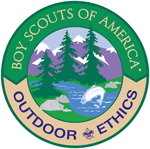Outdoor Ethics Awareness Award

Scouters interested in learning more about outdoor ethics and Leave No Trace should begin by exploring the Outdoor Ethics Awareness Award. The requirements are as follows:
- Recite from memory and explain the meaning of the Outdoor Code.
- Watch the National Park Service Leave No Trace video.
- Complete the Leave No Trace online course. Print the certificate.
- Complete the Tread Lightly! online course. Print the certificate.
- Participate in an outdoor ethics course, workshop, or training activity facilitated by a person who has completed the BSA outdoor ethics orientation course or is a BSA outdoor ethics trainer or master.
Outdoor Ethics Action Award
The Outdoor Ethics Action Award challenges Varsity Scouts and Scouters to take affirmative steps to improve their outdoor skills. The requirements for the Outdoor Ethics Action Award are as follows:
Scouter Action Award Requirements
- Do the following:
- Earn the Outdoor Ethics Awareness Award.
- Complete the BSA outdoor ethics orientation course.
- Discuss with your team how each of the four points of the Outdoor Code guides your actions when outdoors.
- Read the North American Skills & Ethics booklet to learn about the principles of Leave No Trace. Review the principles of Tread Lightly! Review the chapters about Leave No Trace, using stoves and campfires, hygiene and waste disposal, and traveling and camping in special environments in the Fieldbook.
- Facilitate your team’s leadership in planning and leading an outing that emphasizes the complete set of Leave No Trace or Tread Lightly! principles. All members of the team participating in the outing should use outdoor ethics and the specific skills to minimize impacts from their use of the outdoors.
- Help plan and participate in at least three outings where your team can follow the Outdoor Code and practice the principles of Leave No Trace and Tread Lightly! Facilitate a discussion at the end of the outings.
- Assist your unit in arranging for a service project emphasizing outdoor ethics with a local landowner or land manager. The project must be approved by the landowner or land manager in advance. Participate in that project. The project should lead to permanent or long-term improvements.
- Make, or facilitate youth in making, a presentation at a roundtable or similar gathering about what your team did for Requirement 4.


